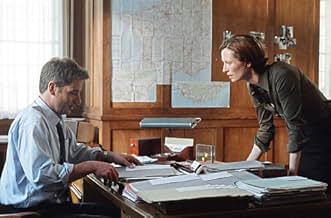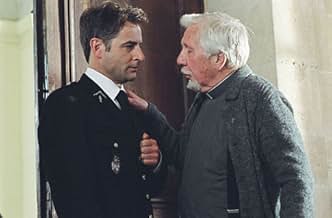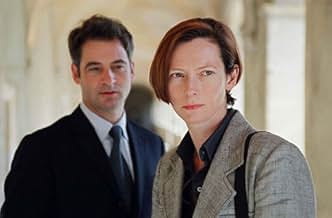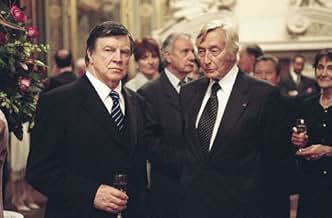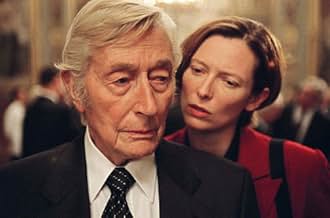PUNTUACIÓN EN IMDb
6,2/10
5,7 mil
TU PUNTUACIÓN
Un ex verdugo nazi se convierte en objetivo de sicarios e investigadores policiales.Un ex verdugo nazi se convierte en objetivo de sicarios e investigadores policiales.Un ex verdugo nazi se convierte en objetivo de sicarios e investigadores policiales.
- Dirección
- Guión
- Reparto principal
- Premios
- 4 premios en total
David de Keyser
- Dom André
- (as David De Keyser)
Reseñas destacadas
In looking through the other comments here and listening to responses as I left the theater after watching 'The Statement,' I've noticed a lot of criticism about the use of English actors using English accents in a movie set in France.
I won't venture to discuss the merit of this choice, but I wanted to point out, in case anyone is that interested, that this is an old stage tradition. The same thing came up when 'Enemy at the Gates' came out, where English actors played Russian characters without affecting Russian accents. It's not uncommon to assign, across the board, English actors/accents to the linguistic majority of a production. I don't know if this stems from the historical preeminence of the London stage or because English accents are thought to be less problematic for American audiences or what, but I do know that this is something that happens quite often and originated in live theatre.
I won't venture to discuss the merit of this choice, but I wanted to point out, in case anyone is that interested, that this is an old stage tradition. The same thing came up when 'Enemy at the Gates' came out, where English actors played Russian characters without affecting Russian accents. It's not uncommon to assign, across the board, English actors/accents to the linguistic majority of a production. I don't know if this stems from the historical preeminence of the London stage or because English accents are thought to be less problematic for American audiences or what, but I do know that this is something that happens quite often and originated in live theatre.
After the Nazi's were driven out of France, those who had collaborated were mostly rounded up and punished many by death. However some escaped and were hidden, while others rose in power within the new regime. Pierre Brossard is one of the former and continues to live in fear, protected from those that would avenge his victims by his friends within the Catholic Church. However a close encounter shows that some group is closing in on him, meanwhile political pressure from Judge Livi and Colonel Roux's investigation into his whereabouts mean that he is quickly running out of friends willing to shelter him.
It is difficult to know how to approach this film because it itself doesn't seem too sure of what it is trying to do. Is it a drama looking at the idea of fleeing war criminals? Is it a chase movie? Is it a character piece looking at Brossard? It is never clear because it does do some elements of each but it doesn't really do anything that well and I, as a viewer, was a bit confused about what I was supposed to feel or think during it. The story itself is OK, reasonably engaging but not having anything of interest to it. As a chase film I was interested and the themes helped it seem more than the sum of its parts but not in reality. The motivations of the characters are never that well developed; the Livi/Roux parts are dull and quite routine although the sections with Brossard are more interesting.
It is a shame then that the film cannot decide what it wants to do with him do we feel for him, hate him or just watch him? The film doesn't let us decide this in a good way representing the complex nature of the character, but rather just doesn't push out any ideas one way or another. Caine does well despite this and gives a good character a bit of depth. He is where the film is although he probably benefits from the fact that everyone else is quite ordinary. Swinton and Northam are quite ordinary and their parts of the film just seem put of place and half-cooked. Support from Neville, Bates, Rampling and others just about do the job but add little.
Overall this is an OK film but nothing at all more than that. Despite the interesting and complex potential the film just delivers an ordinary chase movie and fails to do anything with the ideas and concepts inherent in it. Caine does well to produce quite a convincing character but he is alone in that, with the material and the rest of the cast failing to do anything that interesting. Not bad but not worth trying to find because it is nowhere near as good as one would have hoped.
It is difficult to know how to approach this film because it itself doesn't seem too sure of what it is trying to do. Is it a drama looking at the idea of fleeing war criminals? Is it a chase movie? Is it a character piece looking at Brossard? It is never clear because it does do some elements of each but it doesn't really do anything that well and I, as a viewer, was a bit confused about what I was supposed to feel or think during it. The story itself is OK, reasonably engaging but not having anything of interest to it. As a chase film I was interested and the themes helped it seem more than the sum of its parts but not in reality. The motivations of the characters are never that well developed; the Livi/Roux parts are dull and quite routine although the sections with Brossard are more interesting.
It is a shame then that the film cannot decide what it wants to do with him do we feel for him, hate him or just watch him? The film doesn't let us decide this in a good way representing the complex nature of the character, but rather just doesn't push out any ideas one way or another. Caine does well despite this and gives a good character a bit of depth. He is where the film is although he probably benefits from the fact that everyone else is quite ordinary. Swinton and Northam are quite ordinary and their parts of the film just seem put of place and half-cooked. Support from Neville, Bates, Rampling and others just about do the job but add little.
Overall this is an OK film but nothing at all more than that. Despite the interesting and complex potential the film just delivers an ordinary chase movie and fails to do anything with the ideas and concepts inherent in it. Caine does well to produce quite a convincing character but he is alone in that, with the material and the rest of the cast failing to do anything that interesting. Not bad but not worth trying to find because it is nowhere near as good as one would have hoped.
Pierre (Michael Caine) is a Nazi collaborator who has been in hiding for years. He was going to be executed for his deeds but had help escaping decades ago. Now, a judge and colonel are looking for him....as well as some Nazi hunters. But there are two things standing in their way...Pierre is a pretty deadly man and keeps killing Nazi hunters AND Pierre is still getting help from both members of the Catholic church AND government officials. Can they capture the man? And, can the judge and colonel get him to tell them WHO has been helping him?
Although Michael Caine is the star and he's good in the film, he's actually NOT featured all that prominently in the movie. Instead, it shows the various folks coming after him and explaining why...why folks would help a monster like him. Overall, it's a very interesting movie....with a tory that is quite satsifying. One complaint, however, is the lack of French actors in the film...and everyone is supposed to be French. Another is that the film is supposed to be set in the present day (2003) but I think it would have worked better having been set in the 1960s-80s. It's just hard to imagine a man as old a Pierre being such a tough character who's able to kill various Nazi hunters...it just didn't seem realistic as the crimes he committed occurred in 1944...and that would make his character about 80 (more or less) and I cannot imagine any 80 year-old being that dangerous when cornered.
Although Michael Caine is the star and he's good in the film, he's actually NOT featured all that prominently in the movie. Instead, it shows the various folks coming after him and explaining why...why folks would help a monster like him. Overall, it's a very interesting movie....with a tory that is quite satsifying. One complaint, however, is the lack of French actors in the film...and everyone is supposed to be French. Another is that the film is supposed to be set in the present day (2003) but I think it would have worked better having been set in the 1960s-80s. It's just hard to imagine a man as old a Pierre being such a tough character who's able to kill various Nazi hunters...it just didn't seem realistic as the crimes he committed occurred in 1944...and that would make his character about 80 (more or less) and I cannot imagine any 80 year-old being that dangerous when cornered.
7=G=
Michael Caine carries "The Statement" on his back. In spite of an elegant cast, without him as the central character, this convoluted mess of a film wouldn't be worth watching. Telling of an aging French-Nazi war criminal who finds himself on the run and squeezed in the jaws of subterfuge, "The Statement" is too vague in its historical flashbacks, gives poor depth into its sundry characters, breaches realism with a bunch of Brits in France, never makes its agenda clear, and doesn't sort itself out well in the end...to mention just a few of the flaws. The result is a film with a lukewarm reception by critics and the public at large and little reason to watch save another excellent performance by Caine. In spite of all that, I quite enjoyed this flick. Go figure. (B-)
Your comments will be displayed as follows: A good adaptation of Brian Moore's thriller novel, director Norman Jewison's "The Statement" has its ups and downs.
Michael Caine, who has played many English roles as well as being an American abortion providing doctor, now takes on elderly Frenchman Pierre Brossard, once a shining star of the toady Vichy police force without which the Nazis could never have murdered some 77,000 French Jews. A small percentage of the Holocaust toll but not an unimportant one. Among other acts he participated in the roundup and murder of seven Jews. Such an incident was the basis for the novel.
A man who may belong to a Jewish revanchist organization is killed by Brossard before he can shoot the wheezing, cardiac condition-afflicted former right-hand helpmate for the SS. He's been sheltered for forty years by members of the Catholic clergy.
Tilda Swinton is Judge Levy assigned along with Jeremy Northam, a French army colonel, to find and bring Brossard to trial based on a new law reviving prosecutions against those who committed crimes against humanity. Actually, every important actor in this film except for Charlotte Rampling, who has a small role as Brossard's wife, is English. I'm surprised the French actors' union didn't raise a stink.
This is a chase film with Judge Levy and her colonel either warm or hot on the trail of Brossard who goes from monastery to monastery receiving food, money and help. (In France a judge has vast investigative authority and can and does direct inquiries so the director could credibly have Swinton going from city to city. Imagine Judge Judy flitting about in a chopper ferreting out facts.) At times I thought I was watching a travelogue about the abbeys of Gaul.
There are, of course, hints of a dark conspiracy reaching beyond the Church that I won't reveal.
Caine's peripatetic suspect is deeply religious in the formulaic sense that absolution and ritual salve his conscience but in no way mediate his actions. Caine plays a dirtbag to perfection.
Possibly to avoid charges that the film is unfairly anti-Catholic we're told that
1) the Church is vast, has many subordinate bodies, and those at the top just can't know all that is happening (this defense comes from a gentle librarian-Jesuit priest who also happens to be black, the predominant racial group in the French church).
2) responsibility for aiding genocide by clerics was individual so don't trot out any revisionist Hochhuth/Cornwell/Goldenhagen theories arraigning the Church's leadership.
3) we can't forget that the Resistance was largely communist so maybe there's a rational justification for Vichy's supine collaboration and the very real clerical support for the Nazis if not for every French assisted atrocity.
I despise the mindless Francophobic reaction to France's lack of support for U.S. policy on Iraq. But for too long Vichy and its spineless leaders, Petain and Laval, never mentioned in the film, have gotten a bit of a free ride. So I was happy to see Brossard made frightened as his pursuers close in.
Enjoyable, some nice scenery. Not much more except that Michael Caine is always terrific. And so is Tilda Swinton who brings focused intensity to Judge Levy's unyielding crusade for justice, for that it is.
6/10.
Michael Caine, who has played many English roles as well as being an American abortion providing doctor, now takes on elderly Frenchman Pierre Brossard, once a shining star of the toady Vichy police force without which the Nazis could never have murdered some 77,000 French Jews. A small percentage of the Holocaust toll but not an unimportant one. Among other acts he participated in the roundup and murder of seven Jews. Such an incident was the basis for the novel.
A man who may belong to a Jewish revanchist organization is killed by Brossard before he can shoot the wheezing, cardiac condition-afflicted former right-hand helpmate for the SS. He's been sheltered for forty years by members of the Catholic clergy.
Tilda Swinton is Judge Levy assigned along with Jeremy Northam, a French army colonel, to find and bring Brossard to trial based on a new law reviving prosecutions against those who committed crimes against humanity. Actually, every important actor in this film except for Charlotte Rampling, who has a small role as Brossard's wife, is English. I'm surprised the French actors' union didn't raise a stink.
This is a chase film with Judge Levy and her colonel either warm or hot on the trail of Brossard who goes from monastery to monastery receiving food, money and help. (In France a judge has vast investigative authority and can and does direct inquiries so the director could credibly have Swinton going from city to city. Imagine Judge Judy flitting about in a chopper ferreting out facts.) At times I thought I was watching a travelogue about the abbeys of Gaul.
There are, of course, hints of a dark conspiracy reaching beyond the Church that I won't reveal.
Caine's peripatetic suspect is deeply religious in the formulaic sense that absolution and ritual salve his conscience but in no way mediate his actions. Caine plays a dirtbag to perfection.
Possibly to avoid charges that the film is unfairly anti-Catholic we're told that
1) the Church is vast, has many subordinate bodies, and those at the top just can't know all that is happening (this defense comes from a gentle librarian-Jesuit priest who also happens to be black, the predominant racial group in the French church).
2) responsibility for aiding genocide by clerics was individual so don't trot out any revisionist Hochhuth/Cornwell/Goldenhagen theories arraigning the Church's leadership.
3) we can't forget that the Resistance was largely communist so maybe there's a rational justification for Vichy's supine collaboration and the very real clerical support for the Nazis if not for every French assisted atrocity.
I despise the mindless Francophobic reaction to France's lack of support for U.S. policy on Iraq. But for too long Vichy and its spineless leaders, Petain and Laval, never mentioned in the film, have gotten a bit of a free ride. So I was happy to see Brossard made frightened as his pursuers close in.
Enjoyable, some nice scenery. Not much more except that Michael Caine is always terrific. And so is Tilda Swinton who brings focused intensity to Judge Levy's unyielding crusade for justice, for that it is.
6/10.
¿Sabías que...?
- CuriosidadesAs of April 2019, this is producer and director Norman Jewison's last movie.
- PifiasWhen Brossard searches the killer's wallet, we can see 500 francs banknotes with the head of Pierre and Marie Curie. This kind of banknote was released in 1994 and the action takes place in April 1992.
- Citas
Pierre Brossard: Pray that we meet again... in this world.
- ConexionesFeatures Solo tú (1994)
- Banda sonoraLe Chemin des Forains
Music by Henri Sauguet
Lyrics by Jean Dréjac
Performed by Baguette Quartette
Published by G. Schirmer Inc., administered by Music Sales Corporation
Courtesy of Baguette Quartette
Selecciones populares
Inicia sesión para calificar y añadir a tu lista para recibir recomendaciones personalizadas
- How long is The Statement?Con tecnología de Alexa
Detalles
- Fecha de lanzamiento
- Países de origen
- Sitio oficial
- Idiomas
- Títulos en diferentes países
- The Statement
- Localizaciones del rodaje
- Empresas productoras
- Ver más compañías en los créditos en IMDbPro
Taquilla
- Presupuesto
- 27.000.000 US$ (estimación)
- Recaudación en Estados Unidos y Canadá
- 765.637 US$
- Fin de semana de estreno en EE. UU. y Canadá
- 37.220 US$
- 14 dic 2003
- Recaudación en todo el mundo
- 1.079.822 US$
- Duración1 hora 54 minutos
- Color
- Mezcla de sonido
- Relación de aspecto
- 1.85 : 1
Contribuir a esta página
Sugerir un cambio o añadir el contenido que falta

Principal laguna de datos
By what name was La sentencia (2003) officially released in India in English?
Responde


